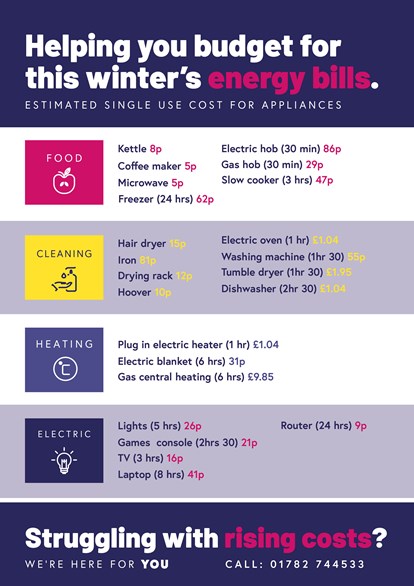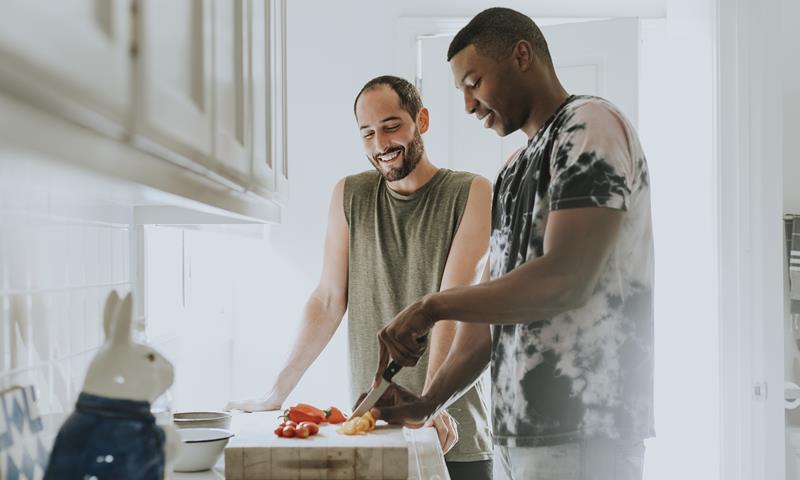Food
Get advice on how to make your food shop last longer and go further.
Personal finances
Get information and advice on personal banking, borrowing money, managing your household budget and more.
Energy
Get advice on reducing your energy bills, what support is available, and how to use your energy more efficiently.
Tips on saving energy and money
Every appliance in your home costs money to run. This guide will help to show you the typical costs and what you can reduce or stop.

Stop those window and door draughts
Have you ever walked into a room and instantly felt a draught? Good-quality draught-proofing will reduce or stop the draughts.
Draughts from outside can come into your home through gaps round doors, letterboxes and even keyholes. Things like letterbox covers and under door draught excluders can help keep the cold air out and the warm air in.
You’ll need to pay an initial up-front cost to do this, but over the long term you’ll save around £30 a year.
Alternatively, the Energy Saving Trust recommends putting transparent clingfilm over windows, as the second layer will help to keep heat in your home.
Wash more clothes less – and try not to use the tumble dryer
Doing one less load of washing a week and setting your temperature to 30° could save you around £10 a year. While it’s not a lot, when coupled with the other tips on this page, the savings will add up and make a difference.
The Energy Saving Trust says you’ll save around £40 a year if you don’t use a tumble dryer. Try drying your clothes on an airer or outside in the warmer weather. If using one inside, make sure to leave a window open as using an airer inside can cause damp if you don’t ventilate your home properly.
Don’t boil more water than you need
The more water you boil, the more energy you use. Don’t overfill your kettle and you could save £8 a year.
Don't leave your devices on standby
Leaving your device on standby uses energy. The Energy Saving Trust says you could save up to £40 a year by turning your devices off rather than putting them on standby. While research from Loop says you could save up to £140.
Turn your heating down by just one degree
Research suggests that doing this can save you around £80 a year. If everyone did it, we could help to reach climate change targets too.
Use your central heating timer
Using your timer means you can set your heating to go off when you’re not in the house or when you sleep. It means you don’t have to rely on remembering to turn it off yourself, or to turn down your thermostat. Plus, you can schedule it back on for when you return home or for when you normally wake up. It means you don’t waste energy by heating up when you’re not home.
Keep radiators free from clutter
Keeping the space around your radiators clear means the heat can easily flow through the room. When you place things like furniture in front of radiators they absorb the heat and it takes longer and more energy to warm the room.
Close your curtains at night
Closing your curtains at dusk will help stop heat from escaping through the windows. You could also use thermal or heavy curtains during the winter months to help keep the heat in.
Choosing whether to use an air fryer or oven
According to research, the average electric cooker costs 87p to run per day, while an air fryer will set you back just 14p per day.
Using the hob
Covering your saucepan with a lid will cook your food faster and save you money. And making sure your hob is clean will also save money, as food or grease on the hob will absorb energy, making it less efficient when cooking food.
Fill your fridge and freezer with bottles of tap water
It takes a lot of energy to keep your fridge and freezer cool, and you’ll use more energy to cool a fridge or freezer that’s only partially full. We recommend filling your empty space with water bottle of bags of ice.
Don’t heat empty rooms
If you won’t be in a room for some time, turn off the radiators and close the door.
Bleed your radiators
If your radiators feel cooler at the top compared with the bottom, you’ll need to bleed your radiator to get rid of any trapped air.
Get support from our Money Advice Team
Our Money Advice Team can help you make the most of your money and help with any money or debt worries. From reviewing your energy bills, working out a weekly or monthly budget or checking your entitled to benefits, the team is here to support you.
If you need advice on any rent issues email hello@staffshousing.org.uk and one of our income officers or money advisers will call you back within 24 hours (Mon-Fri).




